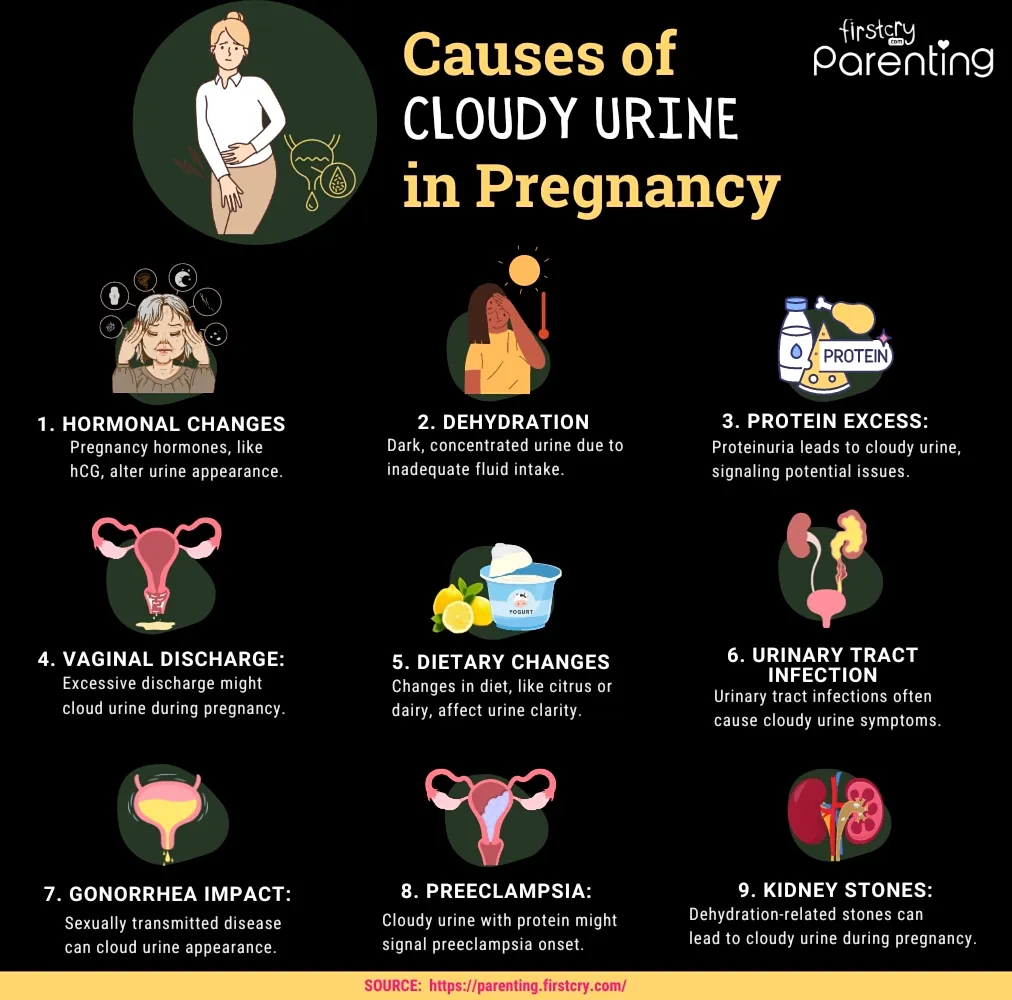Cloudy Urine During Pregnancy – Causes & What Does It Mean

- Is Cloudy Urine a Sign of Pregnancy?
- Is Cloudy Urine Common During Pregnancy?
- Warning Signs to Notice
- What Are the Causes of Cloudy Urine in Pregnancy?
- Different Colours of Urine – What Do They Mean?
- Diagnosis of Cloudy Urine When Pregnant
- Treatment for Cloudy Pee While Pregnant
- When to Consult a Doctor
- FAQs
- Infographic: Causes of Cloudy Urine During Pregnancy
When you’re pregnant, you naturally become hyper-aware of everything that’s happening inside your body. Every little change makes you curious as to what’s happening and why it is happening. One of these includes the change in urine. You may notice that the colour and odour of your urine are different. Believe it or not, the colour and odour of the urine are also indicators of some medical ailment you may be facing. The colour of normal urine ranges from pale yellow to yellow. If you notice cloudy urine in pregnancy, there may be several reasons. What could be the cause of this? Is it a reason to worry? Does it mean that the baby is in distress? Find out the answers to all these questions and more! It helps to be aware of every possible change to decide the next course of action.
Is Cloudy Urine a Sign of Pregnancy?
Cloudy urine is not a reliable or specific sign of pregnancy. While hormonal changes in early pregnancy can sometimes alter urine’s appearance, it’s more commonly caused by other factors. These include dehydration, a vaginal infection, or the presence of certain minerals. A missed period and a positive pregnancy test are much more definitive indicators.
Is Cloudy Urine Common During Pregnancy?
The answer to the above question is both yes and no. During pregnancy, your body will go undergo several changes and you may notice changes in your urine colour too. Due to the hormonal changes, medication, and dietary changes during pregnancy, your urine may appear hazier than before. Normal urine has no odour and is slightly yellowish. If you register any changes in both these characteristics, it may be due to some underlying medical condition.
Warning Signs to Notice
While often harmless and linked to dehydration or hormonal shifts, foggy urine during pregnancy can sometimes signal an issue that requires medical attention. It’s important to recognise the warning signs that accompany cloudy pee to ensure both your health and your baby’s.
1. Accompanied by a Burning Sensation or Pain
If your cloudy pee is accompanied by a burning sensation when you urinate or pain in your lower abdomen, it could be a sign of a Urinary Tract Infection (UTI). UTIs are common in pregnancy and need prompt treatment to prevent complications.
2. Presence of a Strong or Foul Odour
While urine odour can change, a very strong, foul, or unusual smell along with cloudiness can indicate an infection. This is a key cloudy pee pregnancy symptom that should not be ignored.
3. Cloudiness with Fever or Chills
The combination of cloudy urine with a fever, chills, or back pain suggests the infection may have reached your kidneys (pyelonephritis). This is a serious condition that requires immediate medical care.
4. Noticeable Blood in the Urine
If your hazy urine during pregnancy appears pink, red, or brownish, it could indicate the presence of blood. This warrants an immediate call to your healthcare provider to rule out issues like kidney stones or a severe infection.
What Are the Causes of Cloudy Urine in Pregnancy?
Your urine may appear cloudy because of the excess white blood cells fighting infection or the presence of blood in the urine. Apart from that, there are many reasons for cloudy urine in pregnancy. Here are some reasons for the same.
1. Hormonal Changes
The primary cause of cloudy urine in pregnancy is hormonal changes. During pregnancy, your body will undergo hormonal changes to support the growing foetus. Some hormones like human chorionic gonadotropin (hCG) may increase rapidly during the first trimester, thus making your urine cloudy.
2. Dehydration
Nausea and vomiting is not only an extremely uncomfortable experience but it may also lead to dehydration. If you are dehydrated during pregnancy, your urine will become darker and concentrated and may appear cloudy. During pregnancy, your body needs more water to support the placenta, amniotic fluid, and the growing baby. So, you must up your fluid intake. Inability in doing so may lead to dehydration, which could result in cloudy urine.
3. Proteinuria
When there is an excess of protein in the urine, it is called proteinuria. Proteinuria or too much protein in the urine can also make your urine appear cloudy. This may usually happen during the second or third trimester. If the excessive amount of protein in urine is accompanied by high blood pressure, it may be an early indication of preeclampsia (1).
4. Vaginal Discharge
Vaginal discharge is very common during pregnancy. However, if there is excessive vaginal discharge during pregnancy, it may make your urine cloudy. If you register this symptom, it is recommended that you seek medical advice as increased vaginal discharge may be due to some underlying medical condition.
5. Dietary Changes
Pregnancy may make you crave for all kinds of food, which you normally wouldn’t consume. Sudden or abrupt changes in diet, for instance, including orange juice, asparagus, or dairy products in more amounts in your pregnancy diet may make your urine hazy and cloudy. If you register changes in urine due to dietary reasons, try eliminating them from your diet to see if it helps.

6. Urinary Tract Infection
A urinary tract infection is very common during pregnancy and is one of the many reasons for cloudy or milky urine during pregnancy. If you urinate frequently, your urine smells foul and appears cloudy, then you may have a urinary tract infection (UTI) (4).
7. Gonorrhoea
Gonorrhoea is a sexually transmitted disease that may cause urine to turn cloudy. Therefore, if you are experiencing any kind of pain while urinating or excessive vaginal discharge along with cloudy urine, there is a likelihood that you may be suffering from gonorrhoea (5).
8. Preeclampsia
Preeclampsia is a condition that affects the kidney and liver and causes high blood pressure. This condition usually develops after the 20th week of pregnancy and in the beginning, you may not notice any symptoms. This is why you should go for regular check-ups and get your urine tested. The presence of protein in urine is a sign of developing preeclampsia. If there is protein in your urine and it appears cloudy, it could be a sign of preeclampsia (2).
9. Kidney Stones
Sometimes, cloudy urine could be caused by kidney stones. If you are dehydrated, you have more chances of developing kidney stones (3).
Different Colours of Urine – What Do They Mean?
The changes in the colour of the urine may be due to various reasons. Read on to know about the different colours of urine and the reasons for the same (6).
1. Pink or Red Coloured Urine
Red or pink colour urine is not alarming or dangerous, not always. If you notice that your urine is red, it may be because of the consumption of more red-coloured food. Sometimes, the red colour in the urine could also be because of the presence of blood – in this case, it could mean a serious health condition such as kidney disorders, internal injury, or even cancer.
2. Dark Orange or Brown Urine
If your urine is of this colour, it is not a good sign. Dark orange or brown coloured urine is an indication of excessive bile secretion and this could mean that there may a serious liver problem.
3. Bright Yellowish-Orange
Bright yellow and orange coloured urine means that you may have consumed too much yellow-coloured food. Apart from this, consuming some other medicines may also make your urine turn bright yellowish-orange.
4. Blue or Green
Taking certain medicines such as laxatives or chemotherapy medicines can make urine appear bluish-green. However, if you are not on medication and your urine appears blue or green, you should get yourself examined.
Diagnosis of Cloudy Urine When Pregnant
Cloudy urine can be a symptom of various underlying conditions, from mild dehydration to more serious infections or metabolic disorders. Proper diagnosis is essential to determine the cause and guide appropriate treatment.
- Medical History and Symptom Evaluation: Doctors will begin by reviewing the patient’s medical history and discussing accompanying symptoms such as pain, fever, or changes in urination patterns. This helps narrow causes like urinary tract infections (UTIs) or kidney issues (7).
- Laboratory Tests: A urinalysis is performed to check for abnormalities such as white blood cells, proteins, or bacteria. Further tests, including urine culture or blood tests, may be conducted to identify infections or systemic conditions like diabetes or kidney disease.
Treatment for Cloudy Pee While Pregnant
Cloudy urine could be caused by various medical ailments. However, you may try some of these tips to deal with cloudy urine and early pregnancy:
1. Stay Hydrated
Drinking water and staying hydrated will help flush out toxins from your body and thus help in lowering the symptoms of cloudy urine (8).

2. Drink Cranberry Juice
Cranberry juice has substantial amounts of phytonutrients, which are helpful in lowering the symptoms of UTI, kidney stones, and other such ailments that may cause cloudy urine (9).
3. Limit the Intake of Sugary and Salty Foods
Foods with more sugar content in them may increase the risk of diabetes, which may cause cloudy urine. Similarly, eating salty foods can also increase the chances of kidney problems that may cause cloudy urine. Limiting the intake of both may reduce the symptoms of cloudy urine.
4. Take Prescribed Medicines Only
Do not self-medicate or take more than the required dosage of medicines during pregnancy, as it may be the cause of cloudy urine in the first place.
5. Try Warm or Hot Compress
If you have cloudy urine, you may experience pain in the abdominal region. Using a warm or hot compress may help alleviate the pain in the abdominal region that may be due to the infection. This also helps in reducing inflammation and the appearance of cloudy urine.
6. Take Enough Rest
Rest as often as you can The doctor may even tell you to reduce your salt intake. Also, in some cases, more frequent follow-ups may be recommended.
7. Get Tested for STDs
Make sure you get yourself tested for STDs. If the test turns out positive, the doctor will prescribe the appropriate medication.
When to Consult a Doctor
Cloudy urine may or may not be a cause of concern, but checking with a doctor is always best, especially during pregnancy. Therefore, in the following cases mentioned below, you should seek immediate medical help:
- If cloudy urine is accompanied by vomiting or nausea in the third trimester of your pregnancy
- If you have a fever
- If you experience itching in your genitals

- If it is accompanied by cramps in the second trimester of your pregnancy
- If you find it difficult to sit in one position
- If you notice blood in your urine
- If your urine smells
- If you experience pain while urinating
- If you have pain in your abdomen and lower back
- If you have the urge to urinate frequently
FAQs
1. Is cloudy urine more common in certain trimesters?
Cloudy pee in pregnancy can occur at any stage but may be more noticeable in the second or third trimester due to increased discharge, hormonal changes, or dietary shifts. Always monitor changes and consult your doctor if needed.
2. Can cloudy urine be prevented during pregnancy?
Drinking plenty of water, maintaining proper hygiene, and following a balanced diet can help prevent common causes of cloudy urine while pregnant. Regular prenatal check-ups also play a critical role in the early detection of possible issues.
3. Does cloudy urine affect the baby’s health?
In most cases, cloudy urine itself does not harm the baby. However, underlying causes like UTIs or preeclampsia require timely treatment to avoid complications that could impact maternal or fetal health.
Being pregnant with cloudy pee can be a common occurrence due to hormonal changes. If you register cloudy urine during pregnancy, you should report it to your doctor. If you are pregnant and cloudy urine is accompanied by a burning sensation, you should contact your healthcare provider. Your doctor will be able to figure out the cause and suggest the necessary treatment. Take care, and have a healthy pregnancy!
Infographic: Causes of Cloudy Urine During Pregnancy

Also Read:
Urine Leakage During Pregnancy
Frequent Urination in Pregnancy
Change in Urine Color During Pregnancy
Reasons of Smelly Urine While Pregnant
Urine Test and Urine Culture When Pregnant
Was This Article Helpful?
Parenting is a huge responsibility, for you as a caregiver, but also for us as a parenting content platform. We understand that and take our responsibility of creating credible content seriously. FirstCry Parenting articles are written and published only after extensive research using factually sound references to deliver quality content that is accurate, validated by experts, and completely reliable. To understand how we go about creating content that is credible, read our editorial policy here.
1. National Kidney Federation – Proteinuria
3. National Library of Medicine – Renal stones in pregnancy
4. NHS – Urinary tract infections (UTIs)
6. Methodist Health System – What Color Is Your Urine?
7. National Library of Medicine – Urinary Tract Infection in Pregnancy
9. National Library of Medicine – Natural therapeutics for urinary tract infections-a review




































